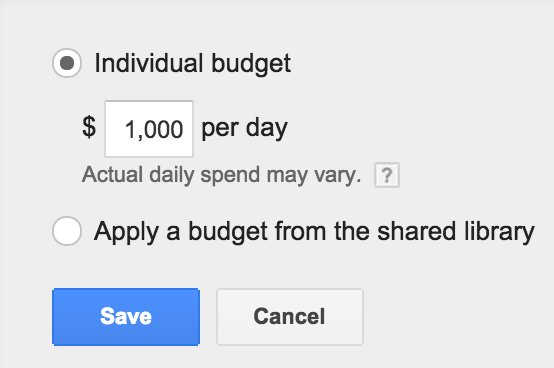Starting off on the right foot with a new PPC account is crucial to the health and performance of efforts moving forward. If the account is set up inappropriately or misaligned with the goals of the business, it can have lingering effects and set you back quite a bit. Also, poor performance from the start will have a bad first impression with the big bosses or clients and could be tough to shake.
You’ll want to research all aspects of the account launch prior to going live to ensure all of your bases are covered. How you structure the campaigns and where you drive traffic plays a huge role in the performance of the account, but what about a strategy for budgeting?
How can budget positively or negatively affect the performance at the start? In this article we’ll dive into some budgeting tactics you may want to take when launching new campaigns or as you optimize the account.
Collecting Data
One of the most important objectives when taking over a new account is allowing it to run and collect the necessary data to then make optimizations and improve performance. Think of it as a continuation of the research you did prior to launching. While tools are great for obtaining certain projections for the account, post-launch data shows true statistics and how your target market is reacting to your campaigns.

For accounts in highly competitive industries with limited budgets, it’s important to analyze and adjust to get the most out of it as possible. We’ve all dealt with different accounts that wanted to get started in PPC, yet were limited in resources. While you can use certain tactics to stay targeted with minimal budgets, like implementing only phrase/exact match or keeping your geo-targeting or custom ad scheduling narrow, these tactics prohibit us from collecting as much data as possible. These tactics may work with the limited budget we’re given, but it could stunt the account growth for the future.
Collecting as much data as possible allows us to back up any sort of hypotheses with real numbers as opposed to guessing, which is never ideal and inaccurate often. I’ve always felt casting a wide net at the start of a new account is the best thing for an account long term. You learn what people are searching and where your account can be most successful. Once you have significant data, then you can tighten things up through the search query reports, ad scheduling, geo-targeting and so on.
While it may not be an easy conversation to have with a client or your boss, it’s best to explain to them the importance of data collection and staying patient. They may not be happy with the spend level you’re suggesting to begin or the initial results, but it’s best they understand it’s an investment for their future in PPC.
Assigning Budgets
Assigning budgets within the account could play a big role in performance from the start. While some may think about assigning budgets after the account is set up, it’s important to strategize prior to building anything, as it may have an impact on how your account is structured.

Say you have a budget of $100/day and you’re building out an account with five different themes. You’ll want to figure out if splitting out these themes makes sense at a campaign or ad group level. Chances are all five themes are not equally valued within the account. In that case, you’ll want to split out the themes at the campaign level to have budgets assigned appropriately. In a situation where all five themes have equal value or you just don’t know yet which will have more value, you still may want to split out the themes on the campaign level to allow yourself that flexibility in the future.
Building all five themes under one campaign as ad groups could potentially choke certain ad groups. If all five are subject to the same campaign budget, whichever ad groups have the most traffic will eat away the majority of the budget, leaving the other ad groups limited to minimal or no budget at all.
In the vast majority of cases, you’ll want to have your themes split at the campaign level to assign budgets to each individual campaign and allow yourself the flexibility to optimize and adjust as time goes on.
Conclusion
Budgeting your account and how you structure your budget within the account can play a pivotal role. Take the time during the research phase to identify how you can delegate budget across all campaigns to maximize performance. Splitting themes at the campaign level will allow you to divide up your budget however you see fit, as well as give yourself more flexibility as the account matures.
Make sure everyone is aware of just how important the data collection process is to the success of the account long-term. Having everyone on board and understanding what to expect will buy you credibility and patience.



